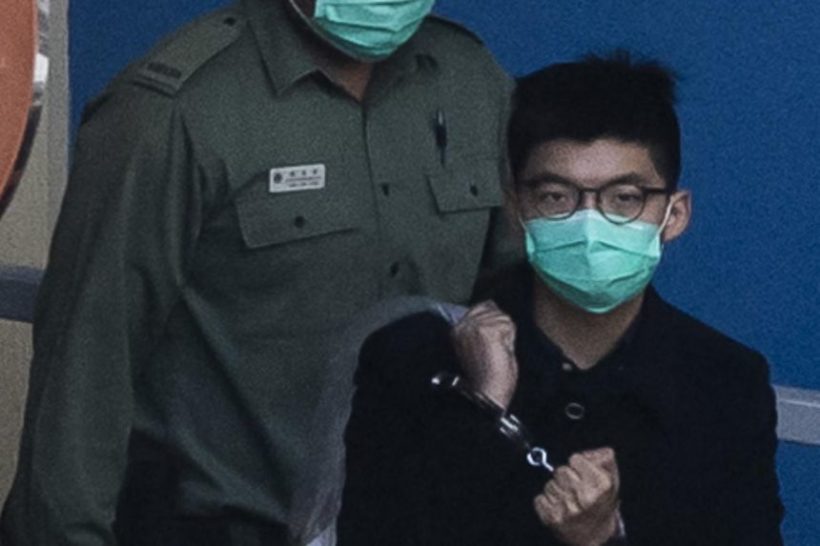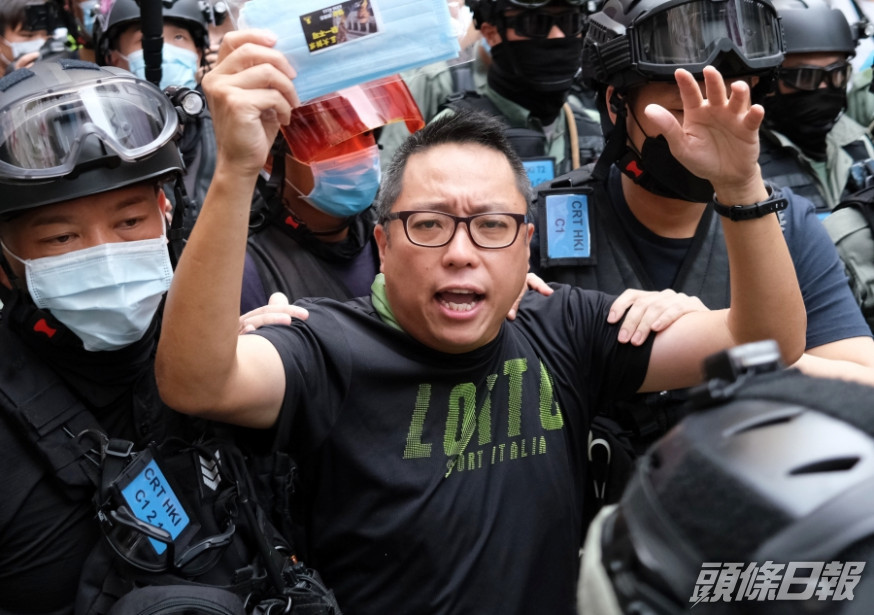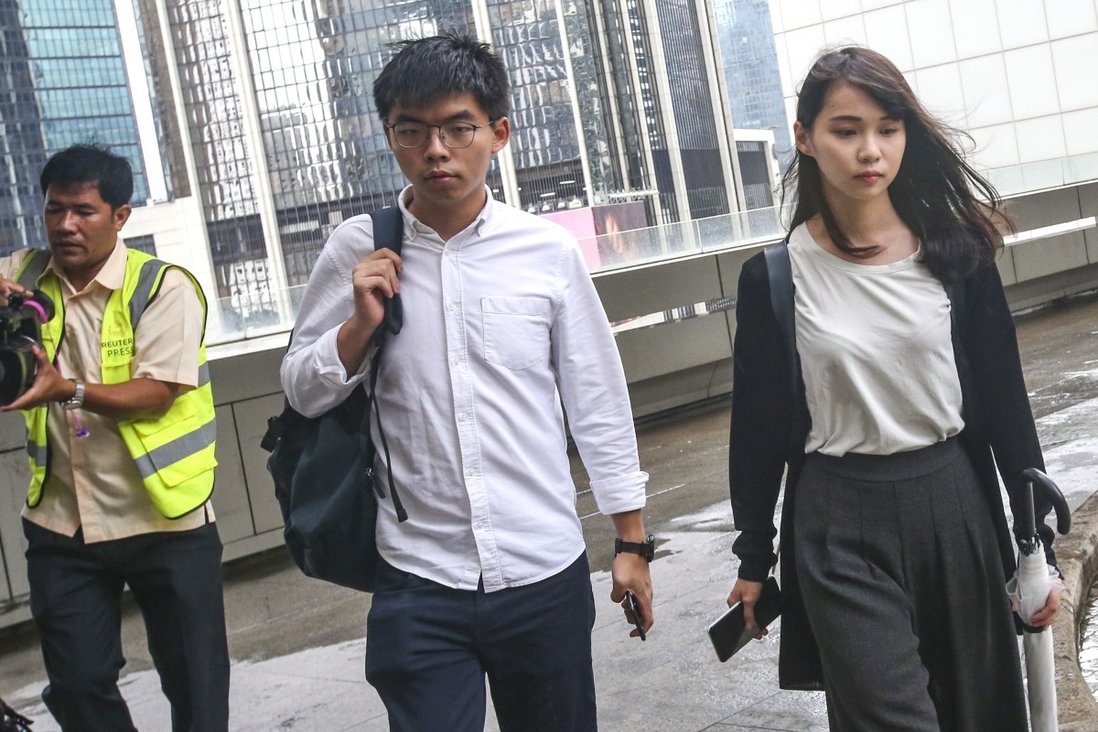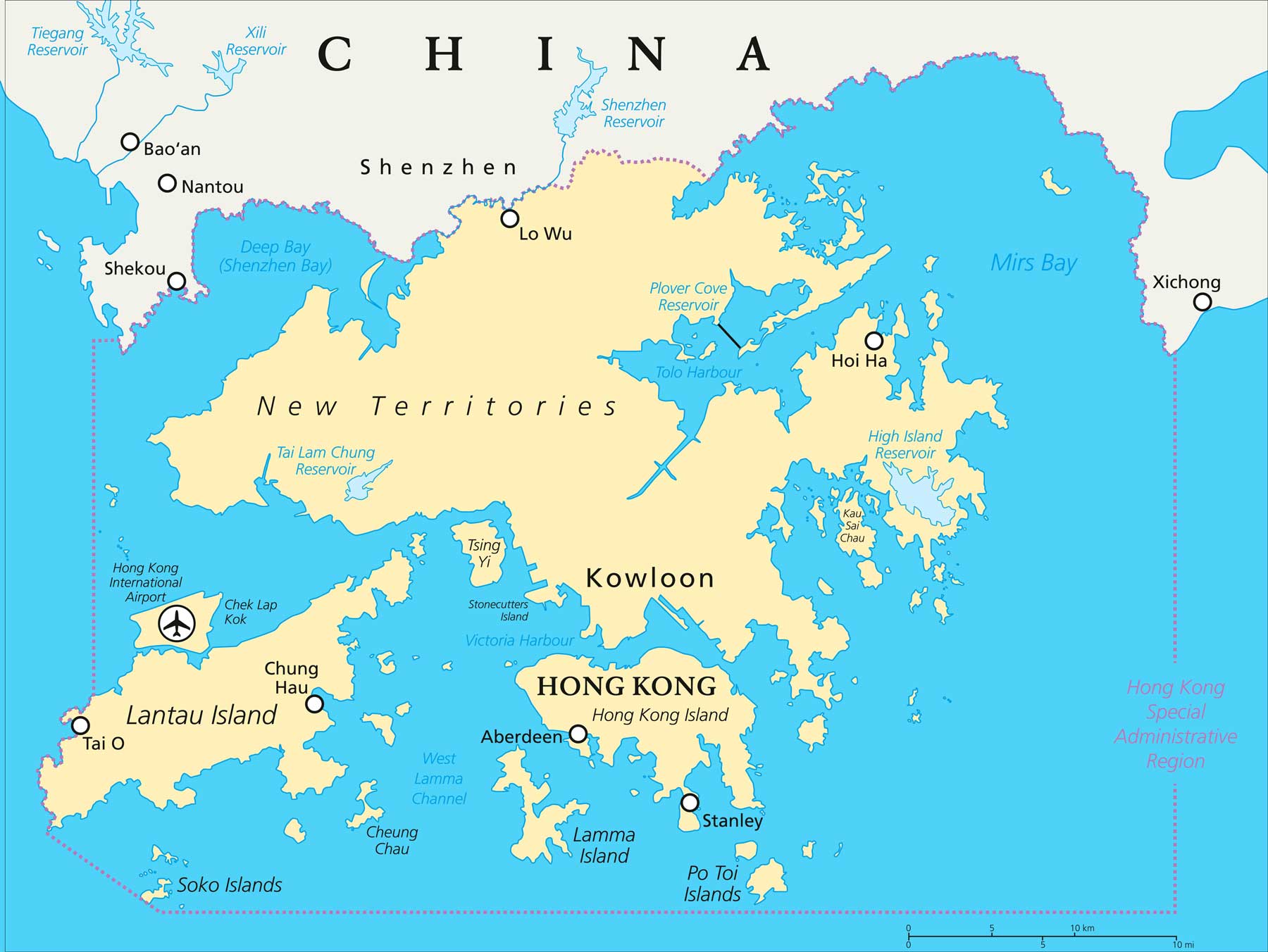
Joshua Wong, 24, was prosecuted and jailed last month by the Chinese Communist Party controlled Hong Kong governmet. Photo: AFP
redo Jump to...
print Print...
NOTE: In June 2020, the Communist Party of China passed a wide-ranging new “security” law for Hong Kong which makes it easier for the communists to punish protesters and reduces the city’s autonomy. Those who support democracy have called it “the end of Hong Kong.”
(by Agence France-Presse (AFP) at Straits Times) HONG KONG – Jailed Hong Kong democracy advocate Joshua Wong was arrested by police on Thursday (Jan 7) under the city’s new national “security” law, a senior police source told Agence France-Presse.
His arrest comes as more than 1,000 police officers detained 53 prominent figures – including a United States citizen – in dawn raids on January 6 on charges of “subversion,” a new national security crime that carries up to life in prison.
The sweep was the latest salvo in Beijing’s battle to stamp out dissent in the semi-autonomous city after millions hit the streets in 2019 with huge…democracy protests.
A senior police source told AFP that Wong – currently serving his sentence in Shek Pik Prison – was arrested on a new charge of subversion, the first time he has been detained under the new national security law.
The 24-year-old is one of the city’s most recognizable democracy advocates and is currently serving a jail sentence for his role in organizing democracy protests.
Local media reported that Tam Tak-chi, another activist currently in custody on a sedition charge, was also arrested for subversion on Thursday morning.
The alleged offense of those arrested for subversion was to organize an unofficial primary last summer to decide who would run as candidates for the city’s partially-elected legislature in the hopes they might take a majority for the first time.
Many of those candidates were ultimately disqualified from running and authorities [also] cancelled the election, [claiming it was due to] the coronavirus.
But Chinese and Hong Kong officials [claimed] the primary was an attempt to “overthrow” and “paralyze” the city’s government and was therefore a threat to national security. …
Those charged with national security crimes are not usually granted bail.
The national “security” law was imposed on Hong Kong in late June [by the Chinese Communist Party controlled government in Hong Kong] in response to the 2019 protests, targeting acts Beijing deems to be secession, subversion, terrorism and collusion with foreign forces.
Officials said the “security law would target only an “extreme minority” and was needed to restore stability after 2019’s huge…democracy rallies.
Wong was prosecuted and jailed last month alongside fellow activists Agnes Chow, 23, and Ivan Lam, 26, over a rally outside the police headquarters.
The three pleaded guilty to various charges including inciting an unlawful assembly. Chow was sentenced to 10 months in jail and Lam, seven months.
Wong, Chow and Lam joined Hong Kong’s pro-democracy movement when they were in their teens.
They organized successful rallies in 2012 against plans to make Hong Kong’s education system more “patriotic” [i.e. forcing Chinese communist propaganda on the students].
And they played prominent roles two years later in the Umbrella Movement – a 79-day peaceful occupation by a largely student-led campaign calling for universal suffrage.
From Agence France-Presse (AFP) published at Singapore’s StraitsTimes on Jan. 7. Reprinted here for educational purposes only. May not be reproduced on other websites without permission.
See pro-democracy activist Joshua Wong’s twitter page. and millionaire entrepreneur democracy activist Jimmy Lai’s twitter page.
Questions
NOTE: Before answering the following questions, read the info under “Background” and “Resources” below.
1. List the who, what, where and when of the news item.
2. Define sedition and subversion as used in the article.
3. A government is referred to by its capital city (Washington or the White House is the Trump administration; London or Downing Street is Boris Johnson’s administration; the Kremlin or Moscow is Putin’s administration; Beijing represents Xi Jin Ping’s Communist Party government). What is Beijing’s goal for arresting 53 pro-democracy advocates last week?
4. Joshua Wong and other pro-democracy advocates are currently jailed for sedition – what did they do to bring this charge against them?
5. What did those arrested for subversion while already jailed for sedition do to earn them this latest arrest? What is their “crime”?
6. How did Beijing get away with passing a national “security” law in Hong Kong? (What was the CCP’s [Chinese Communist Party’s] excuse for passing the law?)
7. Joshua Wong and other young pro-democracy advocates (as well as jailed millionaire 70 year-old Jimmy Lai) are not afraid of the CCP. They do not give up, they do not give in. They peacefully stand up for truth, freedom and democracy. What is your reaction to the courage of these young (and old) men and women?
Background
HONG KONG NATIONAL SECURITY LAW: (from BBC News)
In June 2020, the Communist Party of China passed a wide-ranging new security law for Hong Kong which makes it easier for the communists to punish protesters and reduces the city’s autonomy. Those who support democracy have called it “the end of Hong Kong.”
The details of the law’s 66 articles were kept secret until after it was passed. The law came into effect June 30, 2020, an hour before the 23rd anniversary of the city’s handover to China from British rule.
It gives Beijing powers to shape life in Hong Kong it has never had before. Critics say it effectively curtails protest and freedom of speech – China claims it will return stability.
The new law’s key provisions include that:
- Crimes of secession, subversion, terrorism and collusion with foreign forces are punishable by a maximum sentence of life in prison
- Those found guilty will not be allowed to stand for public office
- Companies can be fined if convicted under the law
- Beijing (China’s communist party) will establish a new security office in Hong Kong, with its own law enforcement personnel – neither of which would come under the local authority’s jurisdiction
- This office can send some cases to be tried in mainland China – but Beijing claims it will only have that power over a “tiny number” of cases
- In addition, Hong Kong will have to establish its own national security commission to enforce the laws, with a Beijing-appointed adviser
- Hong Kong’s chief executive (the Communist-supported Carrie Lam) will have the power to appoint judges to hear national security cases, raising fears about judicial autonomy
- Beijing will have power over how the law should be interpreted, not any Hong Kong judicial or policy body. If the law conflicts with any Hong Kong law, the Beijing law takes priority
- Some trials will be heard behind closed doors.
- People suspected of breaking the law can be wire-tapped and put under surveillance
- Management of foreign non-governmental organizations and news agencies will be strengthened
- The law will also apply to non-permanent residents and people “from outside [Hong Kong]… who are not permanent residents of Hong Kong”.
On July 1, 2020, the day after China passed the “National Security” law for Hong Kong, pro-democracy protesters were out to voice their support for free speech. Vox reported on July 14:
When Britain handed Hong Kong over to China in 1997, it was with the promise that Beijing would honor Hong Kong’s quasi-independence until at least 2047, under the rule known as “one country, two systems.” The Chinese government has slowly eroded Hong Kong’s autonomy in the years since…
The imposition of the national security law…directly threatens Hong Kong’s civil society, independent press, and, most obviously, the territory’s sustained pro-democracy movement.
The law means the “complete and total control of Hong Kong and total destruction of Hong Kong’s system,” Victoria Tin-bor Hui, a political science professor at Notre Dame University, told me.
Pro-democracy protesters [agreed]:
“I guess we have all seen this coming, but it just feels very surreal to everyone that Hong Kong is truly under ‘one country, one system,’” Fung, a 27-year-old protester who asked to be identified by only her surname out of concern for her safety, told me.
Fung said that she and many of her friends awakened, bit by bit, to the totalitarianism of the Communist Party. Yet she held on to a little hope, a kind of dream, that the Chinese Communist Party could become more liberal, more free. Until now.
“Today, with this law passed, my friends [and I] think that we can never go back to what things were. Now we’re just another city, like China’s Guangzhou or Shanghai or Beijing, one of the cities under mainland China’s control,” Fung said.
Another protester, a 22-year-old who asked to remain anonymous for their safety, said via WhatsApp, “It’s really the first time that I had a genuine feeling that I would be arrested just because of speaking aloud a slogan or holding a poster on the street.”
What is the Sino-British Joint Declaration? It is an agreement signed by Britain and China in 1984 to settle the future of Hong Kong. The two governments agreed China would reassume control of Hong Kong, which was occupied by Britain after the Opium War in 1840, from July 1, 1997 and Hong Kong would have autonomy* for 50 years. [*autonomy is the quality or state of being self-governing, especially: the right of self-government]
- In accordance with the “one country, two systems” principle agreed between the UK and the China, the communist system of China would not be practiced in the Hong Kong, and Hong Kong’s previous capitalist system and its way of life would remain unchanged for a period of 50 years until 2047.
- During Hong Kong’s Umbrella Revolution in 2014, a campaign against the infringements on freedom in Hong Kong by mainland China, Chinese officials said for the first time, that China considered the Joint Declaration “void,” a position dismissed as “clearly wrong” by a senior Hong Kong legal scholar and rejected by the British foreign secretary, who noted that the document was a legally binding agreement that must be honored. (wikipedia, adapted)
Resources
- Thousands march in Hong Kong against extradition law (April 30, 2019)
- Hong Kong Protesters appeal to Trump for help (Sept. 10, 2019)
- In October 2019, the NBA’s Houston Rockets GM tweeted an image that said “Fight for Freedom. Stand for Hong Kong.” After that, “China bans Houston Rockets following GM tweet”
- CARTOON “LeBron” (Oct. 18, 2019)
- EDITORIAL: “How the NBA censored me on American soil” (Oct. 17, 2019)
- Hong Kong: China suspends U.S. military port calls over pro-Hong Kong (Dec. 3, 2019)
- China arrests Hong Kong pro-democracy activists (April 20, 2020)
- Hong Kong’s new hotline: inform on your neighbors (Nov. 10, 2020)
Daily “Answers” emails are provided for Daily News Articles, Tuesday’s World Events and Friday’s News Quiz.






